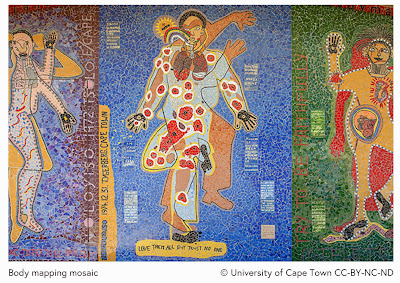 |
| From E-Learning VI |
Fig.1. © University of Cape Town CC-BY-NC-ND
It has been a lifelong, and rather futile quest of mine expressed in writing and art, diaries, blogs and stories and fed by academic study and non-academic spiritual and cranky pursuits to understand who I am - not what I am. There is in consciousness something rather odd going on that no amount of research into my ancestry, or to living relatives, no amount of writing or painting or visualising of ideas can explain. Is it not a trait of being a teenager to feel alien to the world? Although in my fifties I don't think the euphoria of being a teen is a phase I've yet to pass through Fascinating. I could study neuroscience or get drunk and paint a mural on the side of the house like Jackson Pollock, but I don't think it would get me any closer to finding an answer ... even if I had fun doing so. To sum it up for all of us, to excuse and explain all behaviour from Gandhi to Hitler, from Hockney to Terry Gilliam, Richard Dawkins to Robert Winston, I simply think that each of us is unique - yet ironically society and others repeatedly fight to contain us.
I've been prompted to express this by a question posed to participants on the course 'Medicine and the Arts' from the University of Cape Town on FutureLearn.
An utterly absorbing, heartfelt conversation so sympathetically and convincingly shared. Worth of many return visits and further deep study. I'm driven by a limiting interest in everything. My curiosity knows no bounds - which is limiting, as it might be enlightening. It is easy to visualise the dog chasing its tail, though in my mind, excusing the vanity and narcism of it I see myself more as that omnipresent foetal child from the end of Stanley Kubrick's 2001: A Space Odyssey.

